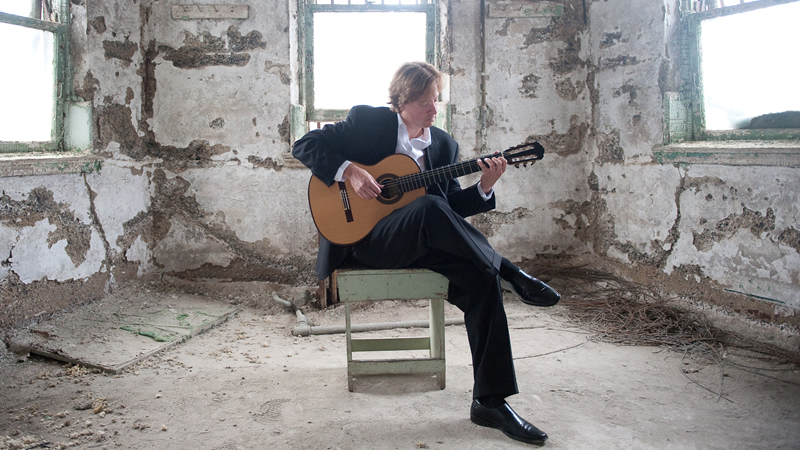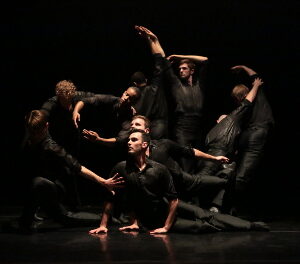Guitarist Jason Vieaux (US, b.1973) shared his incredible musicality and sensitive playing to a large, receptive crowd in Christ United Methodist Church. Vieaux, playing as part of the Music for a Great Space series, has been described by National Public Radio as “perhaps the most precise and soulful classical guitarist of his generation.” He has racked up an impressive list of achievements and awards including the Guitar Federation of American International Guitar Competition First Prize, a Naumburg Foundation top prize, and in 2015, a Grammy Award for Best Classical Instrumental Solo album. And he is no stranger to Greensboro audiences, having inaugurated the guitar program at the Eastern Music Festival in 2015 and performed there every summer since.
The evening opened with the Sonata in A, K.208, by Domenico Scarlatti (Italy, 1685-1757), arranged by Leo Brouwer (Cuba, b.1939). Scarlatti is best known for his 555 keyboard sonatas, only a few of which were published during the composer’s lifetime. This sonata, like all of the composer’s sonatas, is a single two-part movement written for harpsichord. Side note: supposedly Scarlatti and Handel had a competition in Rome, where Scarlatti was declared better on harpsichord but not on organ.
Maybe the transcription is superior to the original. At least that’s how it seemed in Vieaux’s hands. From the outset the listener was impressed with the complete command the guitarist has over his instrument. Subtle shadings of dynamics coupled with a lovely freedom of expressivity marked his playing throughout the evening.
As is the case with most MGS concerts, the artist engages the audience with interesting stories about the pieces being played. Variations on a Theme of Handel, Op. 107, by Mauro Giuliani (Italy, 1781-1829), was the next piece. Giuliani was a contemporary of Beethoven, and he played in the premiere of that composer’s Seventh Symphony (probably in the cello section). But he is best known as the leading guitar virtuoso in the early 19th century. Vieaux described him as “the Paganini of the guitar.”
The eight-minute work is comprised of a theme and six variations. Written in a Classical style, each subsequent variation becomes more ornate, with faster notes. The penultimate variation is set in the minor mode, allowing for the performer to conclude with virtuosic fireworks, which was exactly what Vieaux did.
Vieaux explained that Baroque violin sonatas were written in the four-movement “sonata da chiesa” (church sonata) form: slow-fast-slow-fast. The guitarist chose to play his own arrangement of Violin Sonata No. 1 in G minor, S.1001, by Johann Sebastian Bach (Germany, 1685-1750). Bach’s sonatas and partitas for violin are considered “among the most profound in the repertoire.” They were all written by 1720. The first movement Adagio is beautifully dark, with fast flourishes and sudden full-chord stops, terrifically brought out by Vieaux. The following Fuga features a repeated-note motif, always clearly enunciated. The slow Siciliano was elegantly played. The concluding Giga was a fiery, fast piece that flew under the guitarist’s fingers.
After intermission Vieaux played Quatre pièces brèves (1933), by Frank Martin (Switzerland, 1890-1974). These four short pieces are the composer’s only contribution to the guitar literature. Although the composer was influenced by Arnold Schoenberg, Martin remained tonally based. Vieaux commented that the piece is reminiscent of the Bach sonata: four movements in differing tempos, the last of which (“Comme une Gigue”) is gigue-like. The piece is not as obtuse as might be expected. The opening “Prelude” wanders slowly until the tempo quickens. The “Air” was hauntingly beautiful. “Plainte” (Complaint) featured repeated chords that supported a sobbing melody. The fourth movement was swiftly moving. One could not ask for a better advocate for a convincing performance than Vieaux.
The rest of the concert was given over to music from South America starting with Vals, Op. 8, No. 4, by Agustín Pío Barrios (Paraguay, 1885-1944). Vieaux said Barrios was known as “the Chopin” of the guitar. The waltz was festive and provided yet another venue for Vieaux’s incredibly facility.
The song “A Felicidade” (Congratulations) by Antônio Carlos Jobim (Brazil, 1927–94), heard in the movie Black Orpheus, provided a vehicle for Vieaux to display a more pop style. This arrangement by Roland Dyens (France, 1955-2016) featured a jazz-infused Pat Metheny (US, b.1954) introduction.
The five-movement Suite del Recuerdo (Suite of Memory) by José Luis Merlin (Argentina, b.1952) concluded the program. It was dedicated to the memory of many thousands of “disappeared ones” from the days of the military junta in Argentina. The piece is a virtual tour of regions and dances of Argentina: a perfect conclusion to a magnificent concert.
An extended applause and standing ovation eventually persuaded Vieaux to return to the stage to play a fetching arrangement of “What a Wonderful World.”
Note: The writer is a former president and board member of Music for a Great Space.












